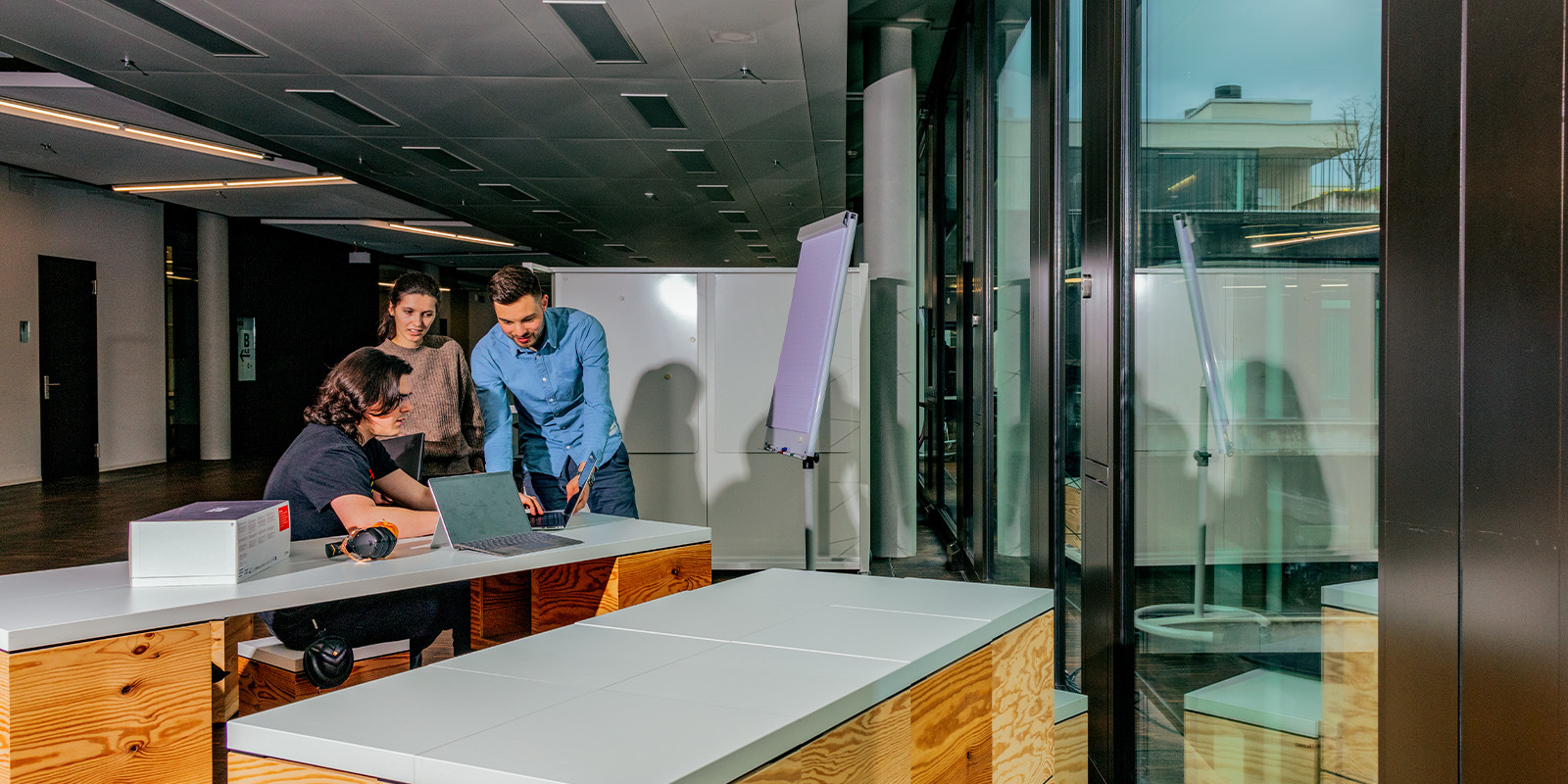How You'll Study with Us
At the School of Computer Science, you'll study in a flexible and interdisciplinary manner, and with a strong connection to practical application.
Project work is the hallmark of education at the School of Computer Science. From the first semester on, you'll work on concrete assignments and projects with real-world applications. Clients come from industry and business sectors.
In these projects, you'll learn to work in teams and communicate with external partners. Additionally, you'll acquire competencies that are increasingly important in professional life:
- Teamwork, project management, and project leadership
- Various work techniques and creativity methods
- Self-initiative and perseverance
While working on these projects, you can apply what you've learned in practice and deepen your knowledge in your specialized area. In these projects, you'll also establish valuable connections with other students and potentially meet your future employer.
For Design & Management (iCompetence) students, we offer full-time, part-time, and work-study program models. These allow for individualized studying in combination with your career or family.
The work-study program model is ideal for you if you are already working in the field of computer science. We require employment of at least 50%. We recommend working a maximum of 60%. The duration of study is at least four years.
The full-time program takes three years to complete. If you study full-time, it is not possible to work alongside your studies. As a part-time student, you will study together with full-time students but complete fewer modules per semester. With a 40% part-time job, the part-time program typically takes four years to finish.
The School of Computer Science FHNW is a campus-based institution. This means all courses take place in person on campus in Brugg-Windisch. Approximately one-third of the modules in the study track Design & Management (iCompetence) are digitally transmitted and can be attended remotely.
There is no mandatory attendance for iCompetence modules. When you are enrolled in a course, all course materials are available to you. Attendance in courses is not mandatory but highly recommended.
When beginning your studies, many questions may arise: How do I efficiently prepare for an exam? What type of learner am I? How do I manage to keep track of everything?
At the FHNW School of Computer Science, each student has a personal coach. These specially trained coaches guide you through your learning process. Furthermore, your coach provides their experience and contacts for your professional and personal development.
In addition to your coach, advisors at the Programming Center and Mathematics Center are available to answer your questions.
In some modules, you'll receive support from students in higher semesters. Since these peer-tutors completed the modules themselves, they can give you practical tips and support you with exercises or exam preparation.
In humanities and social science modules, you'll expand your horizons beyond computer science education.
The development of linguistic, business, and social science competencies takes place across degree programs. You can choose modules in business administration, communication, English, history, ethics, and sustainability. You'll attend these courses not only with your colleagues from the same program, but with fellow students from the School of Computer Science and the School of Engineering and Environment who have similar interests and prior knowledge.
These modules are offered by faculty from the Institute of Humanities and Social Sciences from the School of Engineering and Environment.
As a computer scientist, you'll work with professionals from other disciplines. Teams are often internationally composed. At FHNW, you have several options to give your studies an international focus:
- International Track
A series of modules at the School of Computer Science is also offered in English. The modules set a content focus, such as International Product Management or International Communication and Cooperation. - iPOLE
Experience both internationality and interdisciplinarity in the iPOLE learning environment. In real projects, you'll network with students from other disciplines and work across cultural and linguistic boundaries. - Study Abroad Semester
As a student at the School of Computer Science, you have the opportunity to complete a semester abroad. Stays at a European partner university are financially supported through the "Swiss European Mobility Programme" SEMP (formerly Erasmus+). You can get more information from the International Office.




